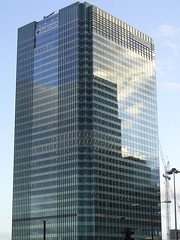
Barclays Bank skyscraper at Canary Wharf
Originally uploaded by Richard and Gill.
"Property rights are the basis of any free society...African countries are poor because the people cannot get land ownership and so can't get credit to increase wealth. Because the land is held collectively."
This is why organisations like the World Bank and the International Monetary Fund encourage the privatisation of land in the developing world. The policy will lead to disaster.
The purpose of banks is to create credit - for example, to enable a farmer to keep going between the time the crops are planted, until they have been harvested and sold. The underlying reality behind this is that there is a stock of wealth that has already been created, for example, from the previous year's harvest, which credit gives access to.
Using land as collateral for credit is sloppy banking practice. It gets banks into trouble when land price bubbles develop and then burst. This happened in Japan about 15 years ago. It has taken the Japanese economy years to recover.
The word "credit" comes from "credo", which means "I believe". The relationship between the person giving the credit and the one receiving it is one of trust. The only sound basis for credit is whether the borrower can repay. Bankers need to evaluate the competence and honesty of the borrower and the viability of their business proposal.
Insisting on collateral is the very opposite and has degraded banking into pawnbroking.
If land was no longer available as collateral then bankers would have to offer credit in the real sense of the word in order to stay in business. It would be a very different kind of banking and a very different kind of economy.
Kommentarer